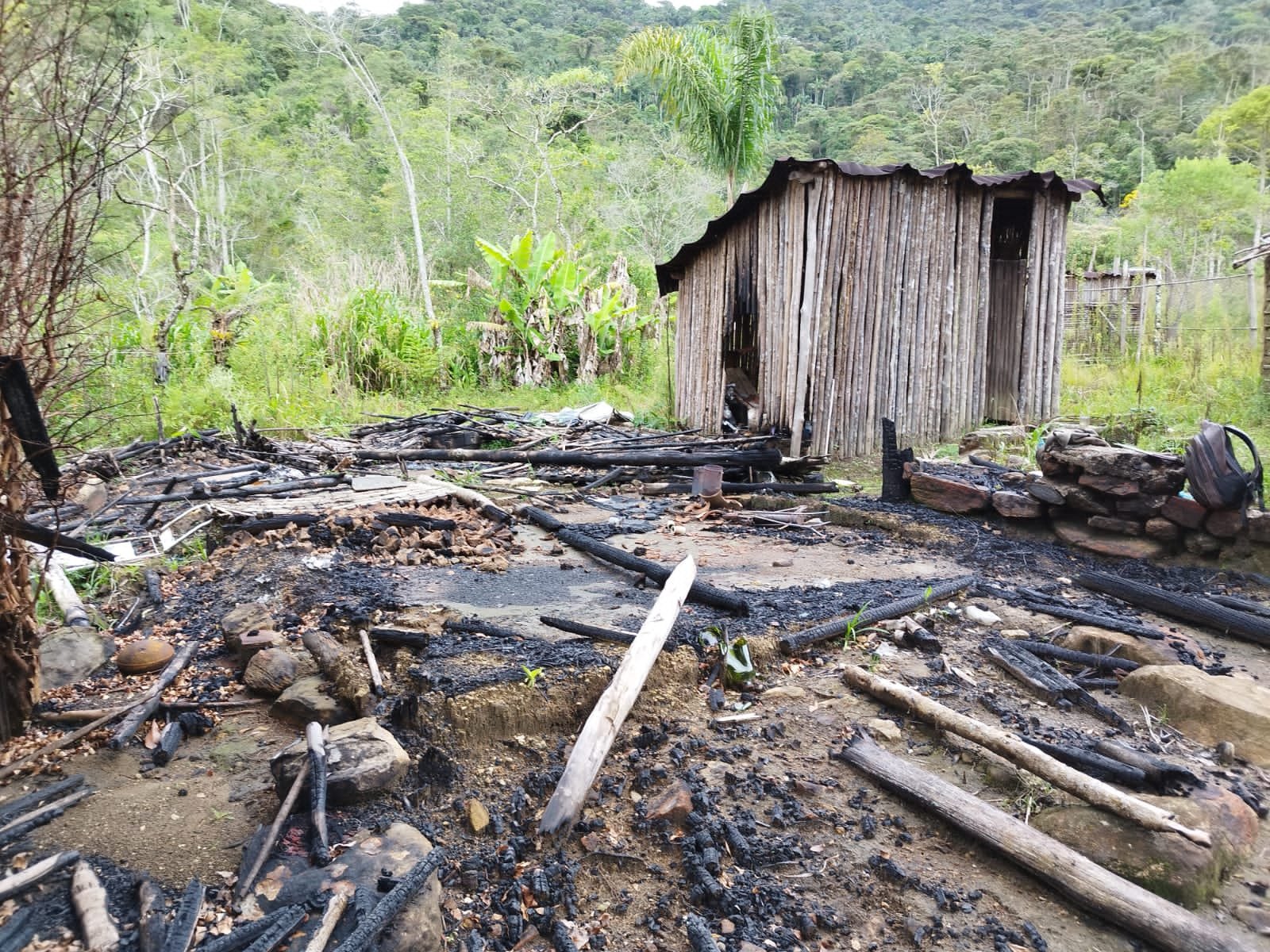Guarani Appeal: Indigenous partner suffers arson attack at sacred site
Our partnership with the Guarani nation to regenerate the Atlantic Forest is more urgent than ever after an arson attack
Rebuilding a sacred site over the carnival
By Priscila, in Brazil
Whilst Brazil celebrates carnival, I’ll be at the top of a mountain rebuilding a desecrated house of prayer with my friends from the Guarani nation. Our recovery won’t be from too much alcohol but from arson.
This tiny aldeia (traditional Indigenous village) is called Tekoá Yy Retxãkã, meaning “crystal clear waters”. There’s no mains water here, nor electricity on top of the mountain. People from the Guarani tribe come here from all over the north of Espírito Santo and beyond, for healing, sacred prayer meetings and traditional births. It’s a site of great spiritual significance. Now, ashes lie on the ground.
I visited a nearby aldeia of the same ethnic group just a few weeks ago, because RAIN has been planning a project with these people. The village is called Nova Esperança, meaning New Hope. Surrounded by a green desert of monoculture eucalyptus trees where the Atlantic Forest used to flourish, these villages are an oasis of biodiversity and hope. We talked, we shared ideas and planted some brazil-wood trees from the Trees of Music project together. And we began to plan for the future.
My new friend Keretxu and her partner Wera Djekupe, leader of Nova Esperança village, told me a story.
How the Guarani came to the Atlantic coast
Almost 100 years ago, the leader’s great-grandmother Tatatin Ywarete set out on a journey that would last more than thirty years. Her trail led her her people along the coast of Brazil, passing through Santa Catarina, Paraná, São Paulo, Rio de Janeiro, and finally Espírito Santo on the Atlantic coast, searching for a sacred land, the “Sinless Land” of her people. After travelling for so long, she finally reached the municipality of Aracruz, a land where her people could practice their traditions and customs. Everywhere they passed, they left behind Guarani aldeias. They still exist today.
At that time, the great Atlantic Forest covered the region with a profusion of fruits and animals. The people lived in abundance, travelling between the coast and the forest.
But it was not to last. The SPI federal agency (Serviço de Proteção Indígena, or the Indigenous Protection Service) exiled the entire Guarani community and relocated them in the state of Minas Gerais. They were unable to return for years, under the pressure of the dictatorship that ruled Brazil for 21 years until 1985. When they finally received the call to return to the land revealed to Tatatin Ywarete, they braved risk and hardship to reach the land they still occupy today.
Indigenous people reoccupy stolen land
Uniting with the Tupiniquim, these two Indigenous nations were able to recover part of the territory. Together they occupy a total of twelve villages over around 19,000 hectares. Almost the entire Atlantic Forest, however, was destroyed for the cultivation of eucalyptus monoculture, to meet the demand of multinational pulp exporters. On the outskirts of the village, the Suzano, Jurong and Imetame corporations exploit stolen Indigenous lands.
RAIN will support the Guarani to build a tree nursery
RAIN wants to support the Guarani to build a tree nursery so that they can begin the work of restoring and regenerating this sacred land with the native abundance of the Atlantic Forest. We want to connect Guarani schools to schools in the UK, to share journeys of regeneration and hope.
In a dark counterpoint to this hopeful vision, the house of prayer for the villages was burned down. The community kitchen was also torched, in a deliberate racist attack with the intention of destroying the heart of the community. But the people of this nation are resilient, and they have supporters both locally and internationally - like you.
So, instead of partying with the rest of Brazil, over the carnival holiday I'll be up here, camping with the people of the community and their friends. We will rebuild this sacred place and offer prayers, songs, healing rituals, and community food. We’ll share our love and celebrate our unity. I’d like to bring some trees from our Trees of Music nursery at UFES (the Federal University of Espírito Santo). I’d like to bring my friends to help in every way I can.
RAIN has offered to share their campaign and to facilitate donations
The Guarani need donations to buy materials for the work and to feed the volunteers. RAIN has offered to share their campaign and to facilitate donations. Every penny of the money donated through RAIN for this appeal will go directly to the Guarani.
Please consider donating. The price of one caipirinha will provide a volunteer with their meals for a whole day’s work rebuilding this sacred site - or even two days, depending on who mixes your cocktails. The Guarani, along with many Indigenous groups in Brazil, are guardians of nature fighting to preserve their forests and their cultures, which are inseparable. Even if we can’t be there to help rebuild, we can share our support and our respect for this resilient culture that holds the key to all our futures.
Written by Priscila
ABOUT RAIN
RAIN is a Community-led reforestation and ecosystem restoration charity. RAIN empowers people in Brazil with community-led initiatives to improve resilience, food security and ecology in regions adversely affected by deforestation and land degradation. Millions of km² of forests have been lost in Brazil and around the world. RAIN brings back the forests via a network of local projects reforesting, regenerating and rewilding degraded land.



